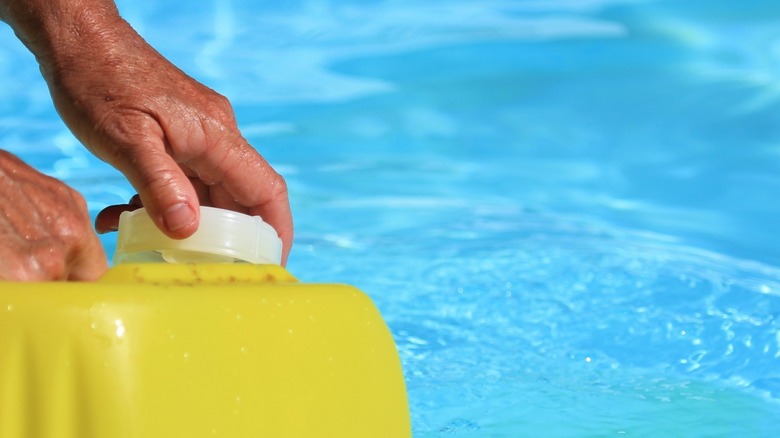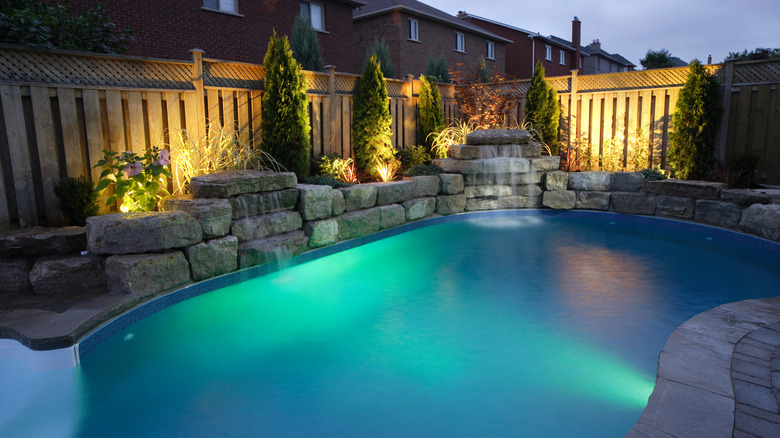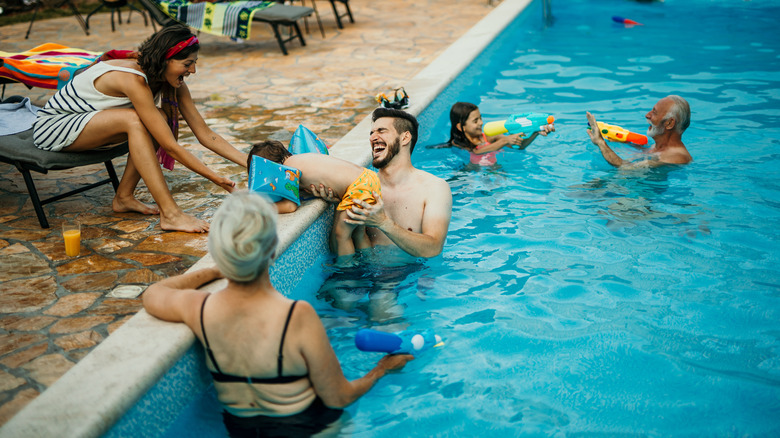The Best Time Of Day To Shock Your Pool
"Honey, I shocked the kids!" is probably the last thing you want to hear unless you're interested in another installment of the 1989 comedy franchise "Honey, I Shrunk the Kids." We're not ... So let's work together to avoid that disaster and make sure you know the best time of day to shock your pool. First, what is a pool shock? It's the process of introducing chemicals like chlorine into the pool in order to increase the chlorine concentration and thereby eliminate issues caused by bacteria, algae, and other harmful microorganisms. The process is an important part of keeping your pool clean.
With the powerful chemicals involved, though, there is no doubt that shocking a pool is serious, and choosing the wrong time of day can really cause some harm. Without getting into graphic details, Jamie Alan, Ph.D., Associate Professor of Pharmacology and Toxicology at Michigan State University, conveyed her insights to Health and made it clear that damage to your skin, eyes, and lungs could certainly be a consequence if you expose yourself to the water too quickly.
However, making an informed choice about shocking your pool takes all of this into consideration and makes sure it's safe. So, for the ideal timing, did you guess late in the day when nobody is looking? If yes, you're right (and maybe a little too sneaky). All joking aside, the evening is in fact the best time to shock your pool for scientific reasons.
Diving into the shocking details
According to experts at Sundance Spas of Edmonton, evening is the best time because the sun can dissolve the chlorine before it has the chance to do its job, reducing its ability to eliminate pollutants from the pool and purify the water. Given that the pool should be left unused for 12 to 24 hours afterward, shocking the pool in the evening can also give you a half-day's headstart toward enjoying your next day of merriment and waterworks.
If you're interested in what precisely determines whether or not the pool is safe to swim in after 12 hours, it's the chlorine levels. As Easy Pool Cleaning explains, the chlorine level should be at 5 ppm or less before you take a dip (while still remaining above 1 ppm for optimal purification). If it's not, try letting it sit for about an hour or so before testing the levels again.
So let's get it straight: Shock in the evening time, wait 12 to 24 hours, check if chlorine is at 5ppm or less, and if yes ... let the swimming festivities begin? That's right, but keep an eye on your pool, because many reasons can still arise for another shock session.
The pool is open; when do I shock it again?
The experts at Dolphin Pool & Spa provide valuable insights into the situations that necessitate a shock in the first place. For one thing, you want to be particularly mindful after large gatherings, as "the additional bather load from active swimmers places significant strain on the pool's chlorine." Pool parties and similar events exponentially increase the chlorine demand in your pool, underscoring the necessity of shock treatment to rebalance the water.
Weather also plays a significant role. In times of hot, sunny weather, in addition to losing chlorine through evaporation, the raised temperature of the water provides ideal conditions for more rapid algal and bacterial growth. Therefore, following a heatwave or a particularly sunny stretch, shocking your pool becomes crucial to keeping the pool safe. Rainfall, as well, can disrupt the pH balance of your water and reduce the efficiency of chlorine by carrying airborne pollutants into the pool. And in extreme cases, heavy rainfall might lead to ground runoff seeping into your pool, another scenario that calls for immediate pool shock.
Therefore, the best time to shock your pool isn't solely dictated by a schedule or simply just the "evening time," but also by other factors like events and weather conditions that require a response. Keeping this in mind ensures a clean, healthy pool environment for everyone's enjoyment.


